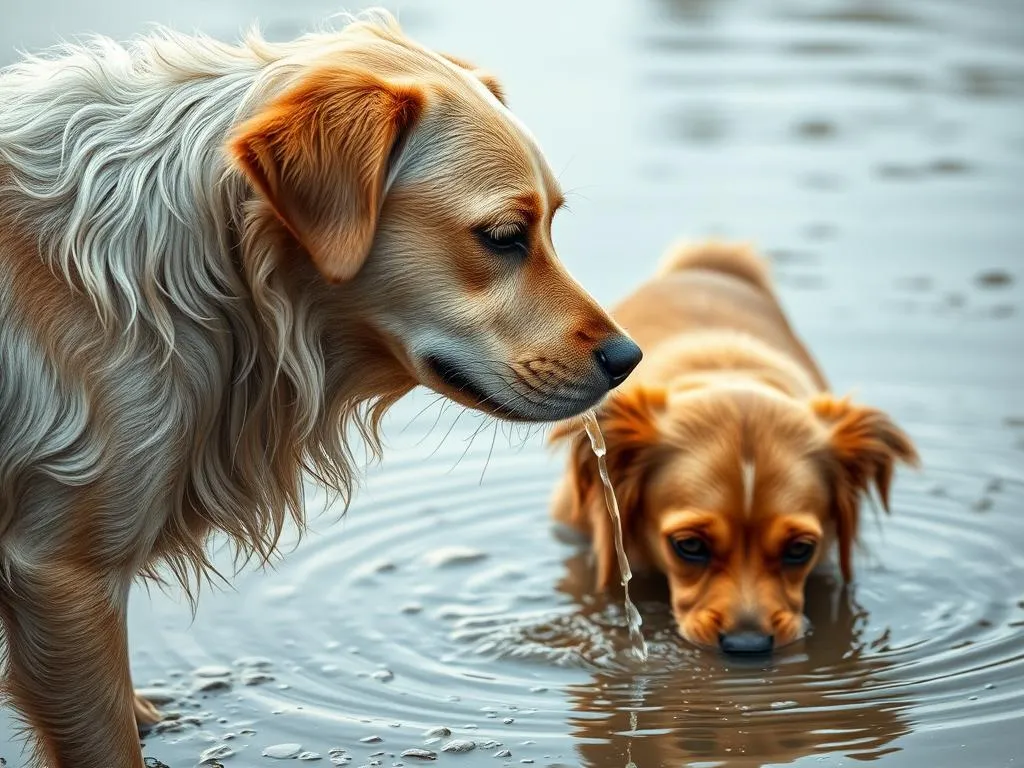
Ensuring your dog remains healthy is a critical aspect of pet ownership. One area that often raises concern among dog owners is water consumption. While it may seem harmless, the question of whether dogs can drink dirty water is a significant one. This article will delve into the implications of dirty water, the risks associated with it, and how to keep your furry friends safe and hydrated.
Understanding Dog Hydration Needs
Importance of Hydration for Dogs
Water plays a vital role in a dog’s overall health. It aids in digestion, regulates body temperature, and helps maintain healthy skin and coat. A well-hydrated dog is less prone to develop urinary tract infections, kidney disease, and other health issues.
Signs of dehydration in dogs can include dry gums, excessive panting, lethargy, and a loss of skin elasticity. If you notice any of these symptoms, it’s essential to act quickly to rehydrate your pet.
Daily Water Intake Recommendations
The amount of water your dog needs can vary based on several factors, including size, activity level, and diet. As a general rule, a dog should drink about one ounce of water per pound of body weight each day. However, this can change with environmental conditions—hot weather or increased physical activity can necessitate additional hydration.
Factors affecting water needs include:
- Weather: Hot and humid conditions increase water requirements.
- Diet: Dogs consuming dry kibble may need more water than those eating wet food.
- Exercise: More active dogs will require more hydration.
Risks of Drinking Dirty Water
What Constitutes “Dirty Water”?
Dirty water can be defined as any water source that is contaminated or unclean. This includes stagnant water, puddles, and water from contaminated sources like rivers and lakes. These sources can harbor harmful organisms and substances.
Common contaminants include:
- Bacteria: Such as E. coli and Salmonella.
- Parasites: Like Giardia and Cryptosporidium, which can cause severe gastrointestinal issues.
- Chemicals: Such as pesticides and fertilizers, as well as harmful algal blooms.
Health Risks Associated with Dirty Water
The dangers of drinking dirty water are numerous and severe. Here are some potential health issues:
- Bacterial Infections: Leptospirosis is a bacterial infection that can be contracted through contaminated water. It can lead to liver and kidney damage and can be fatal if untreated.
- Parasitic Infections: Giardia is a common parasite found in contaminated water. It can cause diarrhea, vomiting, and weight loss.
- Chemical Poisoning: Exposure to harmful chemicals, such as those from algae blooms, can lead to severe health issues, including liver failure.
Symptoms to watch for after drinking dirty water may include vomiting, diarrhea, lethargy, and fever. If your dog exhibits any of these signs, it’s crucial to monitor their condition closely.
Signs Your Dog May Have Consumed Contaminated Water
Immediate Symptoms
If your dog has ingested dirty water, look out for immediate symptoms indicating distress. These can include:
- Vomiting: Dogs may vomit soon after consuming contaminated water.
- Diarrhea: A common response to bacterial or parasitic infections.
- Lethargy: A sudden lack of energy can signal an underlying issue.
- Fever: Elevated body temperature can indicate infection.
Long-term Health Effects
Long-term exposure to contaminated water can lead to chronic health issues. Dogs may experience ongoing infections, digestive problems, or even organ damage from the toxins they ingested. Regular veterinary check-ups are essential for early detection and treatment of any developing health problems.
Prevention Strategies
Monitoring Water Sources
As a responsible pet owner, it’s crucial to monitor the water sources your dog has access to. Here are some recommended practices:
- Avoid Stagnant Water: Always steer clear of puddles, ponds, and other stagnant water bodies where contaminants are likely to accumulate.
- Educate Yourself: Learn to identify safe water sources when out in nature, such as streams or rivers that flow quickly and are less likely to be contaminated.
Providing Clean Drinking Water
To keep your dog healthy, ensure they have access to clean drinking water at all times.
- Regularly Clean Water Bowls: Bacteria can thrive in dirty bowls, so it’s essential to wash them frequently.
- Fresh Water Supply: Change the water in your dog’s bowl daily, and ensure it’s always fresh and cool.
What to Do if Your Dog Drinks Dirty Water
Immediate Steps to Take
If you suspect your dog has consumed dirty water, it’s important to act quickly. Monitor for symptoms such as vomiting, diarrhea, or unusual behavior.
- Hydrate: Encourage your dog to drink clean water to help flush out any toxins.
- Observe: Keep an eye on their behavior and health for the next 24 hours.
Veterinary Care and Treatment
If your dog exhibits concerning symptoms, seeking veterinary care is critical. Common diagnostic tests include fecal exams and blood tests to check for infections or toxins. Treatments may involve medications, such as antibiotics for bacterial infections or anti-parasitic drugs for parasites.
Follow-up care is essential to ensure your dog recovers fully. Always keep your vet informed of any changes in your dog’s condition.
Resources for Dog Owners
Educational Resources
Staying informed is key to being a responsible dog owner. You might consider reading books or visiting reputable websites focused on dog health care. Many organizations also offer workshops and seminars on pet care.
Emergency Contacts
It’s essential to have a plan in case of emergencies. Compile a list of emergency vet clinics and hotlines in your area. Familiarize yourself with their contact information so you can act quickly if necessary.
Conclusion
The risks associated with dogs drinking dirty water are significant and can lead to a range of health issues. By understanding the importance of hydration, recognizing the dangers of contaminated water, and taking proactive measures to ensure your dog has access to clean water, you can help safeguard your pet’s health. Regular veterinary check-ups and being vigilant about your dog’s behavior will also contribute to their overall well-being. Prioritize your dog’s health by providing clean water and seeking professional advice when needed.









